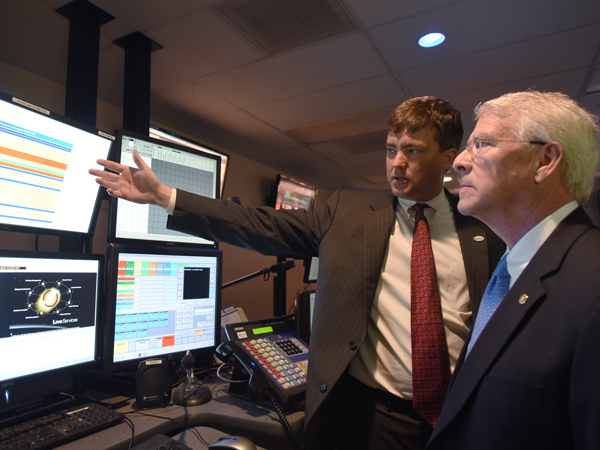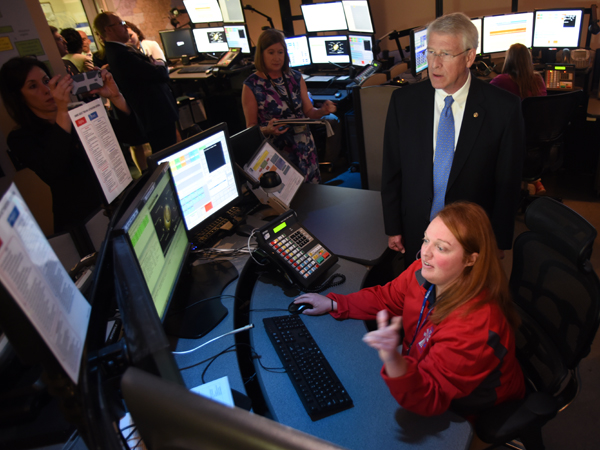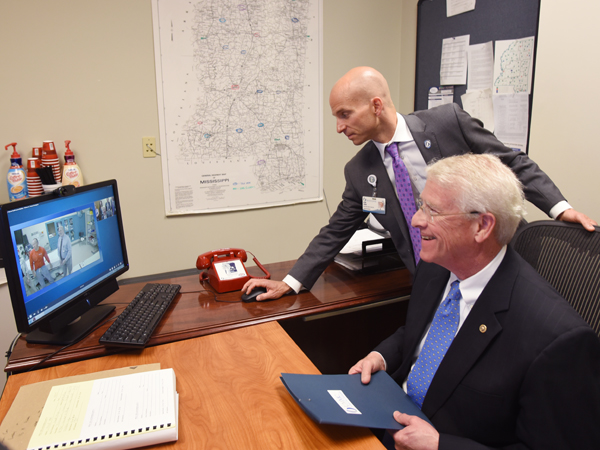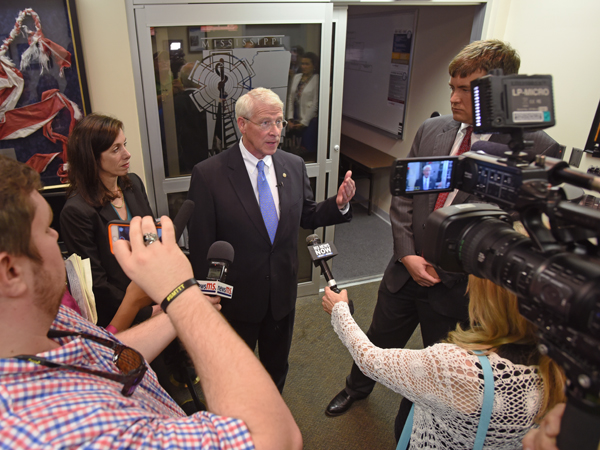Senator gets a glimpse at life-saving telecommunications

U.S. Sen. Roger Wicker knows the University of Mississippi Medical Center has a state-of-the-art, model telehealth program and the nation's first broadband public safety network that connects emergency responders with life-saving health-care providers.
But until Wednesday, Wicker hadn't seen those resources in action. He hadn't seen trauma surgeons videoconferencing with physicians in rural hospital emergency rooms across Mississippi, giving them vital real-time instruction on how to best save their patients' lives.
Wicker hadn't seen paramedics and emergency medical technicians in Mississippi MED-COM, located down the hall from UMMC's Emergency Department, fielding calls from ambulance crews and passing on critical information on patients destined for arrival at the Medical Center and other hospitals statewide.
As he walked through the dimly lit MED-COM control room after taking part in a videoconference with emergency room staff at UMMC's hospital in rural Lexington, it took Wicker no time to process what he saw.
"This is a real success story," Wicker said. "We've seen what can be done, and a glimpse of what more can be done."

Wicker and a number of his staff members visited with the Medical Center's emergency medicine and telecommunications leaders to get an understanding of its role in providing a single point of emergency or disaster contact through MED-COM, and its trailblazing innovation in virtual health care through the use of telecommunications.
MED-COM, which opened in 2008, was created in the wake of Hurricane Katrina after emergency responders and law enforcement agencies were crippled because they had no common radio system that allowed them to talk to each other. UMMC, the state's only Level 1 trauma center, serves as the major emergency referral center through MED-COM.
Last year alone, MED-COM touched in some way 30,000 patients, said Dr. Damon Darsey, MED-COM's medical director.
Wicker learned that through UMMC's telehealth program, which made its debut in 2003, at least 8,000 patients in a total 166 locations are treated each month via videoconferencing with UMMC health-care providers.
"This is just the tip of the iceberg," Dr. Kristi Henderson, UMMC chief telehealth and innovation officer and director of the Center for Telehealth, told him. "People from all over the world are coming here to see our program. We have a model worth replicating."

The Center for Telehealth uses video connectivity to offer services including telemedicine, wellness care, disaster response and education to people throughout the state, especially in the 50 percent of Mississippi's counties where patients must drive more than 40 minutes to receive specialty health care. It's part of UMMC's mission to create a healthier Mississippi and especially reach rural Mississippians most in need.
UMMC's telehealth and TelEmergency programs don't just provide both critical and primary care, Wicker noted. They also save taxpayers millions of dollars.
"We're saving lives, and saving money, because of our connectivity," Henderson said. Just one example: A severely diabetic patient in Ruleville, through the Diabetes Telehealth Network, can be closely monitored and his disease managed by health-care professionals at the Medical Center so that trips to the local emergency room or hospitalization can be avoided.
Although MED-COM's radio system provides adept communication via voice to all of the state's ambulance operations, the capability for UMMC health providers to help treat patients via cameras mounted inside ambulances could potentially save many more lives, Darsey said. "A paramedic on an ambulance in the middle of nowhere could hit a button, and we could help them right then," he said.

As chairman of the Senate Commerce Subcommittee on Communications, Technology, Innovation and the Internet, Wicker leads policy making and oversight for many of the federal entities that regulate and enable communications technologies. Subcommittee jurisdiction includes the Federal Communications Commission (FCC) and the National Telecommunications and Information Administration (NTIA) at the U.S. Department of Commerce, both of which impact the work of UMMC's telehealth and emergency services operations.
"We need equity in how telehealth is funded as opposed to regular health care," Wicker said. "This is an opportunity to save lives and costs at the same time. We have some tasks to perform when we get back to Washington."


